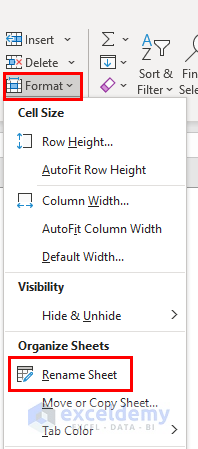Master Excel: Edit Multiple Sheets Simultaneously With Ease

Editing multiple sheets in Microsoft Excel can be a daunting task, particularly if you have a workbook with numerous sheets that contain similar data or require identical modifications. Here's how you can simplify this process:
Understanding Excel Sheets

Before delving into the mechanics of editing multiple sheets, it’s essential to understand how Excel organizes data:
- Workbooks: The Excel file itself, which can contain multiple sheets.
- Worksheets: Individual tabs within a workbook where you input and manage data.
- Cells: The intersection of rows and columns where data resides.
Group Sheets Together

Excel allows you to group sheets, making it possible to edit them simultaneously:
- Hold the Ctrl key and click on the tabs of the sheets you want to group.
- To select a continuous range of sheets, click the first sheet, hold Shift, and click the last sheet in the range.
🌟 Note: Once sheets are grouped, all changes made to one sheet will automatically apply to all sheets in the group.

Editing Techniques in Grouped Sheets

Here are the steps to edit grouped sheets effectively:
- Data Entry: Type your data into any cell on one sheet, and it will replicate across all grouped sheets.
- Formatting: Apply formatting like font styles, colors, or cell borders. These changes will sync across all selected sheets.
- Formulas: When entering formulas, be aware that Excel will adjust references automatically unless you use absolute cell references.
- Deleting or Inserting Rows/Columns: Operations like these will be performed on all grouped sheets simultaneously.
| Editing Aspect | Action in Grouped Sheets |
|---|---|
| Data Entry | Replicates to all grouped sheets |
| Formatting | Applies to all grouped sheets |
| Formula Entry | Adjusted for each sheet; use absolute references for consistency |
| Row/Column Operations | Performed on all grouped sheets |

Advanced Editing Features

While basic editing covers much of your needs, here are some advanced features:
- Use Named Ranges: Grouping sheets is beneficial when you’re working with named ranges that span across multiple sheets.
- 3D References: When performing calculations across sheets, use 3D references to include data from multiple sheets in your formulas.
- Data Validation: Apply data validation rules to grouped sheets to ensure data consistency.
📝 Note: 3D references are not just a grouping tool; they're powerful in summarizing data across sheets.
Common Issues and Solutions

Here are some common problems encountered when working with grouped sheets:
- Sheet names changing: If you rename a sheet in a group, be aware that only that sheet will be renamed; the grouping will not follow the name change.
- Reference Errors: When inserting or deleting rows or columns in grouped sheets, check for reference errors in formulas that may not adjust correctly.
- Grouped Sheets Saving: Always remember to ungroup sheets before saving or printing to avoid unintended changes or formats being applied across all sheets.
Best Practices for Working with Multiple Sheets

- Consistent Layout: Ensure all grouped sheets have the same layout for uniform editing.
- Clear Sheet Names: Use descriptive names for your sheets to keep track of grouped operations.
- Regular Ungrouping: Ungroup sheets regularly to check the individual changes made.
In mastering Excel, editing multiple sheets at once can save you an immense amount of time. With the ability to apply data, formulas, and formatting changes to multiple sheets simultaneously, you can enhance productivity significantly. Excel’s functionality for managing grouped sheets not only streamlines your workflow but also ensures data consistency across your workbook. By grouping sheets together, using named ranges, 3D references, and keeping an eye on common pitfalls, you can manage even the most complex Excel workbooks with ease.
How do I select non-adjacent sheets in Excel?

+
To select non-adjacent sheets, hold down the Ctrl key (Command on Mac) while clicking on the tabs of the sheets you want to group.
Can I ungroup sheets in Excel?

+
Yes, to ungroup sheets, right-click on one of the grouped tabs and choose “Ungroup Sheets,” or simply click on a sheet not part of the group.
What if I make a mistake while editing grouped sheets?

+
If you make a mistake, you can use the “Undo” function (Ctrl+Z or Command+Z on Mac) or manually correct the error in each sheet if necessary.



